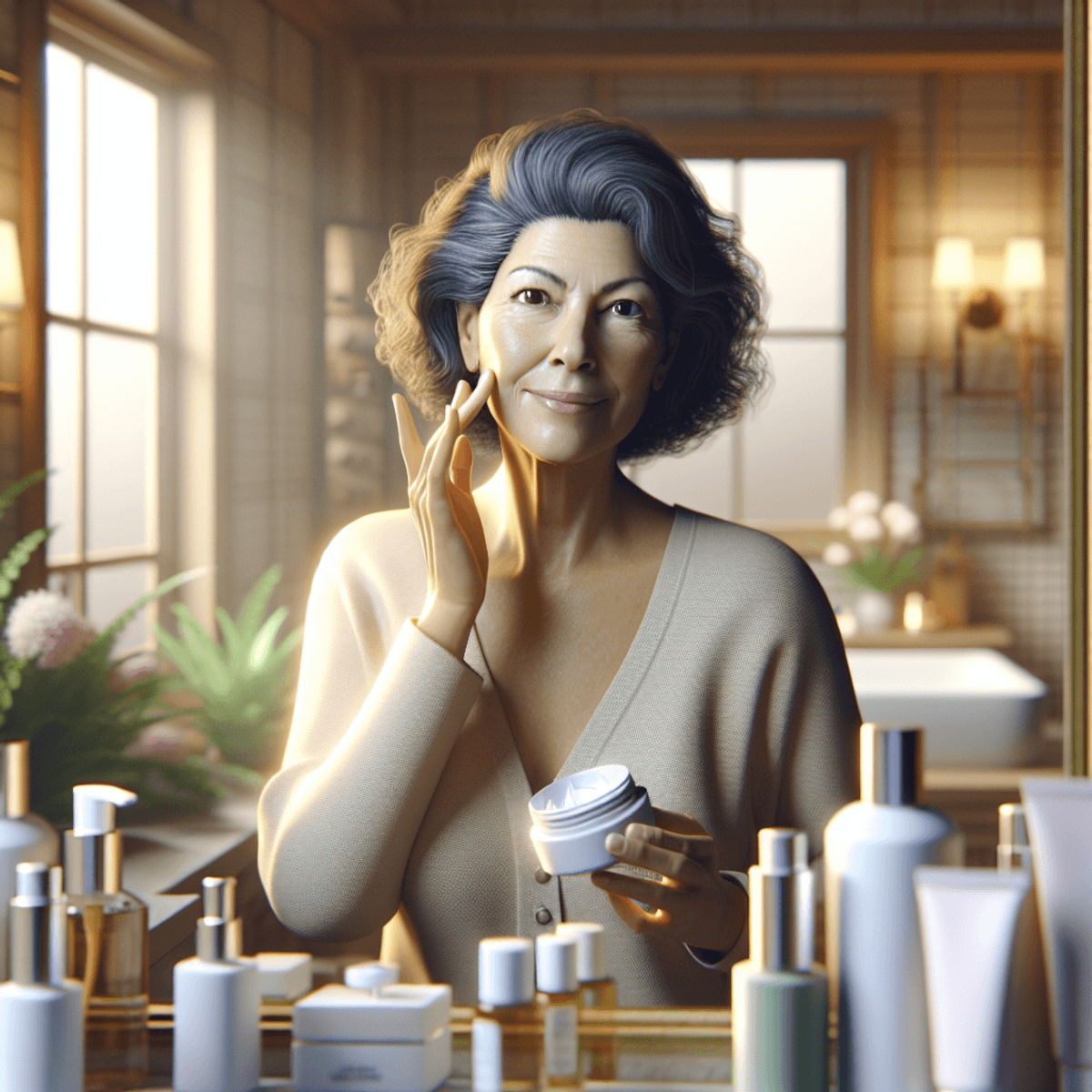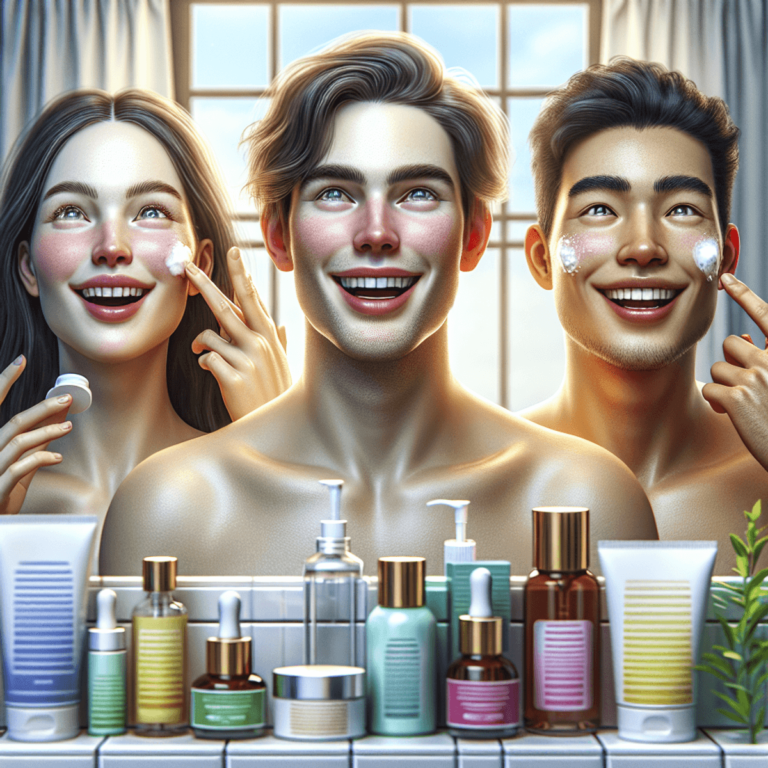Skincare For Mature Skin

Introduction
Skincare for mature skin is essential in maintaining a youthful appearance. As you age, your skin undergoes various changes, making it crucial to adapt your skincare routine. Proper care can enhance skin health, combat signs of aging, and boost confidence.
In this article, you will learn about:
- Understanding the Aging Process: Explore how aging affects your skin’s structure and function.
- Common Issues Faced by Mature Skin: Identify prevalent concerns such as dryness, wrinkles, age spots, and sagging.
- Effective Skincare Routines: Discover practical steps to create a skincare routine tailored to mature skin needs.
- Lifestyle Choices: Learn how nutrition, hydration, sleep, and stress management can influence your skin’s appearance.
By the end of this article, you will have a comprehensive understanding of how to effectively care for aging skin. Embracing these insights will empower you to implement a skincare routine that enhances your natural beauty and promotes healthier skin.
Understanding the Aging Process and Its Impact on Our Skin
As we age, our skin goes through significant changes that affect its appearance and health. Here are some key transformations that occur:
1. Thinning of the Skin
The outer layer of our skin, known as the epidermis, becomes thinner over time. This thinning can make veins and bones more visible, and it may also lead to increased sensitivity and vulnerability to damage.
2. Loss of Fat
As we get older, we tend to lose subcutaneous fat, which is the fat located just beneath the skin. This loss can create a hollowed or sunken appearance in our faces and contribute to sagging skin.
3. Decreased Elasticity
Collagen and elastin are proteins that give our skin its firmness and elasticity. Unfortunately, production of these proteins declines with age, resulting in less resilient skin that doesn’t bounce back as easily after stretching or pinching.
These changes have a significant impact on the health of our skin:
1. Increased Dryness
With oil production decreasing, mature skin often feels drier and more prone to flakiness. This lack of moisture can make fine lines and wrinkles more noticeable.
2. Slower Healing Processes
Wounds may take longer to heal as blood flow decreases and cell turnover rates slow down. Bruising may also happen more easily because the protective layer of our skin weakens.
3. Enhanced Visibility of Imperfections
Age spots, wrinkles, and other blemishes become more prominent over time due to cumulative sun exposure and lifestyle factors.
Understanding how these aging process effects influence your skin is essential for creating an effective skincare routine tailored specifically for your needs. By addressing the unique challenges posed by aging, you can maintain a youthful appearance and promote healthier-looking skin.
Here are some key strategies to consider when developing your skincare routine:
Common Skin Issues Faced by Mature Individuals
Mature skin often faces a variety of challenges that can significantly impact appearance and self-esteem. These challenges are part of the natural aging process, which brings about various changes in the skin. The following are some prevalent skin issues in mature individuals:
1. Dryness
As skin ages, it tends to lose its natural oils and moisture. This can lead to dryness, flakiness, and an uneven texture. Factors like environmental changes, hormonal shifts, and lifestyle choices can exacerbate this condition.
2. Wrinkles
Fine lines and deeper wrinkles become more pronounced with age. They often appear around the eyes, mouth, and forehead due to reduced elasticity and collagen production. Sun exposure and repeated facial expressions contribute to this aging process.
3. Age Spots
Also known as liver spots or solar lentigines, these flat brown patches develop as a result of sun exposure over the years. They typically appear on areas most exposed to sunlight, such as the face, hands, and shoulders. Age spots can be a source of concern for many individuals seeking a more even complexion.
4. Sagging
Loss of fat beneath the skin can result in sagging or drooping. Gravity plays a role in this change as well, causing skin to lose firmness over time. This issue can create an aged appearance that may affect one’s confidence.
The presence of these common skin issues in mature skin goes beyond physical appearance. Many individuals experience a decline in confidence and self-esteem due to visible signs of aging. The desire to maintain a youthful look often leads to increased attention to skincare routines and treatments.
Recognizing these challenges is essential for developing effective strategies that promote healthy skin. Addressing dryness, wrinkles, age spots, and sagging through targeted skincare solutions is vital for enhancing both appearance and self-assurance as we age.
For those looking for personalized solutions to these issues, exploring professional resources such as HE Medical Aesthetics could provide valuable insights into effective treatments for these common skin conditions.
Essential Skincare Steps for Mature Skin
1. Gentle Cleansing to Maintain Balance
A proper skincare routine for mature skin begins with gentle cleansing. As your skin ages, it becomes more delicate and prone to dryness. Using a mild cleanser is crucial for preserving the natural moisture barrier. Harsh soaps can strip the skin of its essential oils, leading to increased dryness and irritation.
The Role of a Mild Cleanser
A gentle cleanser serves several important functions:
- Preserves Natural Oils: It cleanses without removing vital moisture.
- Reduces Irritation: Soothing ingredients minimize inflammation and redness.
- Prepares for Treatment: A clean surface enhances the absorption of subsequent products.
Choosing the right cleanser can make a significant difference in your daily routine. Look for formulations that are free from sulfates and fragrances, as these can be harsh on mature skin.
Recommended Cleansing Techniques
Incorporating effective cleansing techniques into your routine can enhance results:
- Use Lukewarm Water: Hot water can dehydrate the skin, so opt for lukewarm temperatures.
- Gently Massage: Apply the cleanser with soft circular motions using your fingertips. Avoid excessive scrubbing.
- Pat Dry: Use a clean towel to gently pat your face dry instead of rubbing, which can irritate sensitive areas.
Suitable Products to Incorporate
Here are some recommended types of cleansers specifically formulated for mature skin:
- Creamy Cleansers: Ideal for dry skin, they provide hydration while cleansing.
- Gel Cleansers: Great for normal or oily mature skin, offering a refreshing feel without stripping moisture.
- Micellar Water: A versatile option that effectively removes makeup and impurities without rinsing.
Some popular products you might consider include:
- CeraVe Hydrating Cleanser: Known for its ceramide content that helps restore the protective barrier.
- La Roche-Posay Toleriane Hydrating Gentle Cleanser: This product features soothing properties suitable for sensitive skin types.
- Bioderma Sensibio H2O: A micellar water that gently cleanses while maintaining hydration.
Implementing these steps in your daily routine lays a solid foundation for addressing other concerns like dryness, wrinkles, and age spots later on. Prioritizing gentle cleansing will not only enhance your skincare but also contribute to a healthier, more radiant complexion as you age gracefully.
2. Hydration Boosters for Plumpness and Radiance
Maintaining hydration is crucial for mature skin. As skin ages, it tends to lose moisture more easily, leading to dryness and a lackluster appearance. Incorporating moisturizers into your skincare routine for mature skin can significantly combat these issues while promoting a youthful glow.
Significance of Moisturizers
- Combat Dryness: Moisturizers help replenish the skin’s moisture barrier, preventing dehydration. This is especially important for mature skin that may be prone to flakiness or rough texture.
- Promote Youthful Glow: Well-hydrated skin appears plumper and more radiant, which can enhance your overall complexion.
Types of Moisturizers
- Creams:
- Thicker in consistency; ideal for nighttime use.
- Often contain occlusive agents that lock in moisture, making them suitable for very dry skin types.
- Serums:
- Lightweight formulations that penetrate deeper into the skin.
- Typically enriched with active ingredients like hyaluronic acid, which attracts and retains moisture effectively.
- Gels:
- Refreshing and hydrating; great for daytime use.
- They provide hydration without feeling heavy, making them perfect for layering under makeup.
Selecting the right moisturizers for mature skin involves understanding your specific concerns—whether it be fine lines, pigmentation, or loss of firmness. A tailored approach ensures you target your unique needs effectively.
Key takeaway: A consistent and tailored skincare routine is essential for addressing the specific needs of mature skin. Choosing products that promote hydration, firmness, and protection against environmental damage will significantly improve your skin’s health and appearance.
3. Targeted Treatments for Specific Concerns
As you develop your skincare routine for mature skin, incorporating targeted treatments can significantly enhance your results. Focus on active ingredients that specifically address common concerns such as dryness, wrinkles, and loss of firmness.
Key Active Ingredients:
- Vitamin C: Known for its brightening properties, Vitamin C helps even out skin tone and reduce pigmentation. This powerful antioxidant also boosts collagen production, promoting firmness and elasticity.
- Retinol: Renowned for its anti-aging effects, retinol works by accelerating cell turnover and encouraging the shedding of dead skin cells. Incorporate a gentle retinol product into your routine to target fine lines and improve skin texture. Start with lower concentrations to allow your skin to adapt.
- Hyaluronic Acid: An exceptional hydrator, hyaluronic acid draws moisture into the skin, providing plumpness and radiance. Look for serums or moisturizers containing this ingredient to help combat dryness effectively.
Incorporating Active Ingredients:
- Layering Products:
- Apply a gentle cleanser for mature skin as the first step in your routine.
- Follow with a Vitamin C serum in the morning for protection against environmental stressors.
- In the evening, use a retinol product to stimulate cellular turnover while you sleep.
- Finish with a moisturizer rich in hyaluronic acid to lock in hydration.
- Frequency of Use:
- Begin with using retinol twice a week, gradually increasing frequency as your skin builds tolerance.
- Incorporate Vitamin C daily for maximum benefits.
- Patch Testing:
- Always perform patch tests before introducing new products to ensure compatibility with your skin type.
A consistent and tailored skincare routine is essential for addressing the specific needs of mature skin. The importance of using products that promote hydration, firmness, and protection against environmental damage cannot be overstated. By utilizing these active ingredients effectively, you can achieve a more youthful appearance while enhancing overall skin health.
4. Sun Protection – The Ultimate Anti-Aging Shield
Sun protection is a critical component of any skincare routine for mature skin. UV rays can accelerate the aging process, leading to increased wrinkles, age spots, and loss of skin elasticity. Implementing a robust sun protection strategy will help preserve your skin’s health and appearance.
Key Points on Sun Protection:
- Broad-Spectrum Sunscreen: Choose a broad-spectrum sunscreen that protects against both UVA and UVB rays. This type of sunscreen prevents further damage caused by sun exposure, which is essential for maintaining youthful skin.
- SPF Level: Opt for a sunscreen with at least SPF 30. This level offers sufficient protection for daily use. For extended outdoor activities or during peak sun hours, consider using higher SPF options.
- Application Tips:
- Apply sunscreen generously to all exposed skin areas.
- Don’t forget often-overlooked spots such as the ears, neck, and back of the hands.
- Reapply every two hours, or more frequently if sweating or swimming.
- Product Selection: Look for sunscreens that also include moisturizing properties to enhance hydration. This dual action supports the specific needs of mature skin, promoting firmness while protecting against environmental damage.
Key takeaway: A consistent and tailored skincare routine is essential for addressing the specific needs of mature skin. Incorporating sun protection into your daily regimen will significantly contribute to maintaining a radiant complexion as you age.
Lifestyle Factors That Impact Mature Skin Health
Nutrition: Feeding Your Skin from Within
A healthy diet plays a crucial role in maintaining skin health, especially as we age. A balanced approach rich in antioxidants, healthy fats, and essential vitamins can significantly enhance the appearance of mature skin.
Key Nutrients for Mature Skin:
- Antioxidants: These protect the skin from free radical damage. Foods such as berries, dark leafy greens, nuts, and seeds are excellent sources.
- Healthy Fats: Omega-3 fatty acids found in fish like salmon, walnuts, and flaxseeds help maintain the skin’s lipid barrier, keeping it hydrated and supple.
- Vitamins:
- Vitamin C: Essential for collagen production and skin repair. Citrus fruits, strawberries, and bell peppers are abundant in this vitamin.
- Vitamin E: Offers protection against sun damage and promotes skin healing. Nuts, seeds, and green vegetables are rich in vitamin E.
- Vitamin A: Promotes cell turnover and helps reduce wrinkles. Carrots, sweet potatoes, and spinach are great options.
Foods to Include for Radiant-Looking Complexion:
- Fruits: Focus on colorful options like oranges, berries, and pomegranates for their high antioxidant content.
- Vegetables: Incorporate cruciferous vegetables such as broccoli and kale which contain essential nutrients beneficial for skin health.
- Whole Grains: Quinoa, brown rice, and oats provide fiber that assists with digestion and may contribute to clearer skin.
- Hydration: Drinking plenty of water supports overall hydration levels; aim for at least eight glasses a day.
Foods to Avoid:
- Processed Sugars: High sugar intake can lead to glycation processes that damage collagen and elastin fibers in the skin.
- Refined Carbohydrates: White bread and pastries can spike insulin levels leading to inflammation which impacts skin health negatively.
- Excessive Alcohol: Can dehydrate the body and lead to dullness in the complexion.
Incorporating these dietary strategies can make a noticeable difference in how your skin appears as you age. Adjusting your nutrition not only nourishes your body but also supports your skincare routine effectively.
As you adopt these lifestyle changes focused on nutrition, consider how they complement other aspects like hydration and sleep for an all-around approach to mature skin health.
Hydration & Sleep: The Dynamic Duo for Youthful Glow
A good skincare routine is crucial, yet lifestyle factors affecting mature skin health cannot be overlooked. Among these, hydration and quality sleep are paramount in keeping your skin plump and rejuvenated.
Importance of Hydration
Hydration plays a vital role in maintaining skin elasticity and preventing dryness. As skin ages, its ability to retain moisture diminishes. Adequate water intake can help combat this issue by:
- Promoting Elasticity: Well-hydrated skin appears more youthful and resilient.
- Reducing Fine Lines: Hydration helps minimize the appearance of wrinkles.
- Enhancing Radiance: Proper moisture levels contribute to a healthier glow.
To stay hydrated throughout the day:
- Aim for 8-10 glasses of water daily.
- Incorporate fruits and vegetables with high water content, such as cucumbers and oranges.
- Set reminders on your phone to encourage regular water intake.
Quality Sleep
Sleep is another critical factor. During deep sleep, the body undergoes repair and regeneration, including skin cells. Lack of quality sleep can lead to:
- Increased visibility of dark circles
- Dull complexion
- Accelerated aging signs
To establish a relaxing nighttime routine:
- Create a calming environment by dimming lights and reducing screen time an hour before bed.
- Consider incorporating calming activities like reading or meditation.
- Maintain a consistent sleep schedule by going to bed and waking up at the same times each day.
Prioritizing hydration and quality sleep supports your journey toward youthful-looking skin while complementing your established skincare regimen.
Stress Management & Smoking Cessation: Protectors Against Premature Aging
A good skincare routine is crucial for maintaining youthful-looking skin. However, external factors also play a significant role in the aging process. Among these, chronic stress and smoking significantly impact the skin’s health.
Impact of Chronic Stress
Chronic stress can wreak havoc on your skin. It leads to increased cortisol production, contributing to various skin issues such as:
- Inflammation: Heightened sensitivity and redness.
- Breakouts: Acne flare-ups due to oiliness.
- Premature Aging: Loss of elasticity and formation of fine lines.
Managing stress effectively is essential for promoting a healthier complexion. Consider incorporating mindfulness practices into your daily life. Techniques such as meditation, yoga, or even simple breathing exercises can help alleviate stress levels. Engaging in hobbies—such as painting, gardening, or reading—can provide a much-needed mental break.
Smoking Cessation Benefits
Smoking poses serious dangers to your skin’s appearance. The chemicals in cigarettes accelerate aging signs like:
- Wrinkles: Nicotine constricts blood vessels, reducing blood flow and oxygen delivery.
- Sagging Skin: Loss of collagen and elastin leads to decreased firmness.
- Dull Complexion: Smoking hampers the skin’s natural radiance.
Quitting smoking can lead to remarkable improvements in your skin’s health. Benefits include better hydration, improved elasticity, and a more vibrant complexion. Prioritizing these lifestyle factors affecting mature skin health will foster not only a youthful appearance but also overall well-being.
Additionally, it’s important to note that managing stress and quitting smoking are not just beneficial for your skin; they also play a crucial role in promoting overall health and longevity.
When To Seek Professional Help For Your Mature Skin Concerns?
If you’re dealing with ongoing skin issues despite sticking to a consistent skincare routine, it might be time to see a dermatologist who specializes in treating older patients. Professional advice can be incredibly helpful when your self-care efforts aren’t giving you the results you want.
Signs You Should Seek Help:
- Persistent Dryness: If your skin stays dry even after moisturizing properly, a dermatologist can suggest specific treatments.
- Severe Wrinkles or Fine Lines: If wrinkles become more pronounced or new ones appear quickly, professional help may assist in minimizing these changes.
- Age Spots and Pigmentation Issues: Advanced treatments can tackle stubborn pigmentation that over-the-counter products may not effectively resolve.
- Loss of Elasticity or Sagging: A specialist can assess your skin’s condition and recommend suitable procedures to restore firmness.
Benefits Of Personalized Treatment Plans:
- Tailored Approaches: Dermatologists evaluate your skin type, lifestyle, and specific concerns to create individualized plans designed for you.
- Access To Advanced Treatments: Professionals provide options such as chemical peels, laser therapy, or prescription-strength retinoids that are unavailable through standard retail products.
- Ongoing Monitoring and Adjustments: Regular consultations allow for modifications in treatment based on how your skin reacts over time.
Investing in professional care guarantees that you receive effective solutions tailored specifically to your aging concerns. A consultation with a dermatologist can result in improved skin health and boosted confidence.
Conclusion: Embrace Your Age With Confidence Through Skincare And Lifestyle Choices!
Embracing aging confidently requires a commitment to proper care routines and a holistic approach towards well-being. Consider the following strategies:
- Maintain a Consistent Skincare Routine: Incorporate gentle cleansing, effective moisturizers, and active ingredients tailored to your skin’s needs.
- Prioritize Sun Protection: Daily use of broad-spectrum sunscreen shields your skin from harmful UV rays.
- Adopt Healthy Lifestyle Choices: Focus on nutrition, hydration, quality sleep, and stress management.
These practices not only enhance your skin’s appearance but also promote overall health. Embrace this journey with confidence!










